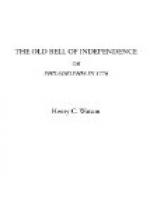’And in the hour of defeat, oh, God of Hosts, do thou be our stay; and in the hour of triumph be thou our guide.
’Teach us to be merciful. Though the memory of galling wrongs be at our hearts, knocking for admittance, that they may fill us with desires for revenge, yet let us, oh, Lord, spare the vanquished, though they never spared us in their hour of butchery and bloodshed. And, in the hour of death, do thou guide us into the abode prepared for the blest; so shall we return thanks unto thee, through Christ, our Redeemer.—God Prosper the cause.—Amen”
During the recital of this interesting and thrilling incident of the Revolution, the veterans—even Higgins, too—laid down their knives and forks, and listened as if carried back to the memorable eve of the battle of Brandywine, and filled with the hopes and fears of the period. At its conclusion, they expressed their approbation of the manner of the recital, and the beauty of the sermon.
“That minister was one of the kind that I like,” said Wilson. “He could preach peace as long as peace was wise, and buckle on his armor and fight when it became his duty.”
“Mr. Harmer handles his pen well,” remarked Morton, “but such an incident would make any pen write well of itself. There’s fire in it.”
“Yes, a whole heap of fire,” put in Mrs. Harmar, who thought she must make a remark, as she had been quieting the children while the latter part of the sermon and the remarks upon it were listened to by the others.
“But the Lord didn’t assist us much in that next day’s battle,” said old Harmar. “We had hard fighting, and then were compelled to retreat.”
“It was all for the best,” said Wilson. “We shouldn’t have known our enemies nor ourselves without losing that battle. The harder the struggle for liberty, the more we enjoy it when won.”
“That’s true,” said young Harmar, “The freedom dearest bought is highest prized, and Americans have learned the value of that inestimable gem.”
The dinner was, by this time, pretty well disposed of, and the party adjourned to the large parlor, where they were soon comfortable seated. Mrs. Harmar would make one of the company, and the children would force their way in to see and hear the “sogers.” The windows were up, and the gentle breeze of summer blew softly through the parlor, thus relieving the otherwise oppressive atmosphere.
But we must introduce the company to the reader. Old Hannar was seated on one end of the sofa, with one of the small children on his knee. He was a stout, hearty-looking man of about seventy, with silvery hair, and a face much embrowned by exposure and furrowed by time. The general expression of his features was a hearty good humor, as if perfectly satisfied with things around. On the other end of the sofa sat Mr. Higgins, a thin, small-featured, bald-headed man, looking much older than old Mr. Harmar.




